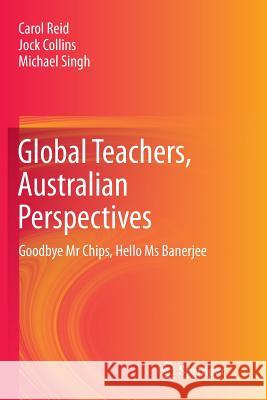Global Teachers, Australian Perspectives: Goodbye MR Chips, Hello MS Banerjee » książka



Global Teachers, Australian Perspectives: Goodbye MR Chips, Hello MS Banerjee
ISBN-13: 9789811011573 / Angielski / Miękka / 2016 / 186 str.
Global Teachers, Australian Perspectives: Goodbye MR Chips, Hello MS Banerjee
ISBN-13: 9789811011573 / Angielski / Miękka / 2016 / 186 str.
(netto: 439,15 VAT: 5%)
Najniższa cena z 30 dni: 458,27
ok. 30 dni roboczych.
Darmowa dostawa!
This book identifies the key drivers - a range of factors from family to policy support - that explain how and why overseas teachers come to Australia and why Australian teachers leave their country to teach overseas.
Wydanie ilustrowane
Foreword - Professor Raewyn Connell
Acknowledgements
About the Authors
Abbreviations
Chapter 1 - Introduction
References
Chapter 2 – Globalizing Teachers: policy and theoretical dimensions
Theoretical Points of Departure
Bourdieu, Reconversion and Tests
Racialization
Critiques and Educational Change
Methodology
Conclusion
References
Chapter 3 Immigrant Teachers in Australia: Quantitative Insights
Introduction
Global and Australian Immigration: contemporary trends and developments
Immigrant Teachers in Australia: background
A Survey of Immigrant Teachers in Australia
Immigration Experience
Experience in Australian Schools
Experience Living in Australia
References
Chapter 4 – Global Teachers’ Pathways to Australia
Introduction
The Demand for Teachers
The Immigration Processes and Pathways to Australia
References
Chapter 5 – The Capital Reconversion of Global Teachers in Australia
Introduction
Red Tape Experiences
Capital Conversion Tests for Global Teachers in NSW Public Schools
First-Generation Critique-Driven Test Corrections
Second-Generation Critique-Driven Test Corrections
Third-Generation Critique-Driven Test Corrections
Critique-Driven Test Corrections
Conclusion
References
Chapter 6 – Internationally Educated Teachers’ Critiques of Tests of their Employability
Introduction
Lack of Authenticity
Inequalities
Oppression
Disenchantment
Conclusion
Bibliography
Chapter 7 – Global Teachers Living and Teaching in Australia
Introduction
Experiences in their New Schools
Discrimination and Racism
Racialised Responses to Immigrant Teachers’ Accents
Racial Discrimination in Schools
The Difficulties of Appointments to Remote Schools
Was it worth it?
What Happens Next?
Conclusion
References
Chapter 8 – Goodbye ‘Mr Chips’: the global mobility of Australian-educated teachers
Being a Foreigner/Waiguoren/Gaigin/Gweilo/Putih…
The Participants and their Characteristics
Qualifications, Destinations and Recognition Overseas
Settling In
Gender
‘Oh, God, I Don’t Have Black Hair or Brown Eyes’
Being a Laughing Stock
Freaky ‘Westerners’
Support Overseas
Home Again: the value of being overseas and bringing back cultural knowledge
Recognition of Overseas Experience
... To Be a Bit of a Gypsy?
Conclusion
References
Chapter 9 – Revisiting Ms Banerjee and Mr Chips
References
Associate Professor Carol Reid (PhD) (Centre for Educational Research, University of Western Sydney) is a sociologist of education whose research focuses on issues of ethnicity, race and education. Associate Professor Reid has a particular interest in the cultural diversity of the teaching profession and teachers work and is also well known in the south-west region of Sydney for having led a number of projects related to ethnicity, youth, education and social exclusion. Carol has been a visiting scholar in Canada and Sweden and has received external research grants from the Australian Research Council, Department of Immigration and Citizenship and Canadian Government. Carol is a regular contributor to media debates regarding education.
Professor Jock Collins (Professor of Social Economics, Management Discipline Group, University of Technology, Sydney, Business School, and Co-Director Cosmopolitan Civil Societies Research Centre, University of Technology, Sydney) has been with the University of Technology, Sydney, since 1977. Prior to that he was a tutor in the Economics Department, University of Sydney. Writing on Australian immigration matters since the early 1970s, Jock is the author of two books and over forty articles in international and national journals and edited books. Jock has been a consultant to the New South Wales Ethnic Affairs Com-mission, the Office of Multicultural Affairs and the New South Wales Department of Treasury. He has received external research grants from the Australian Research Council, the Department of Immigration and Citizenship and the Canadian Government. He often comments on immigration matters in the media in Australia and has an international reputation in the area.
Professor Michael Singh (PhD) is Director of the Research Oriented School-based Eurasian Teacher Education (ROSETE) Partnership, a ten year long Western Sydney-Ningbo project to produce teacher-researchers who can use Chinese theoretic-linguistic assets and modes of critique in analysing evidence of how of make Chinese learnable for beginning second language learners. As Professor of Language and Culture, and Head of Language and International Studies (RMIT University) he helped establish the Globalism Institute, and the Bachelor of Arts (International Studies) which includes Languages Education and an International Internship as compulsory components. As Head of Initial Teacher Education (Central Queensland University) he contributed to developing the Languages and Cultures Immersion Teacher Education Program, 80% of which was taught in Japanese.
This is the first book on global teachers and the increasingly important phenomenon of ‘brain circulation’ in the global teaching profession. A teaching qualification is a passport to an international professional career: the global teacher is found in more and more classrooms around the world today. It is a two-way movement. This book looks at the growing importance of immigrant teachers in western countries today and at teachers who exit from western countries (emigrant teachers) seeking teaching experience in other countries. Drawing on the international literature in Europe, North America, Asia and elsewhere supplemented by rich insights derived from recent Australian research, the book outlines the personal, institutional and structural processes nationally and internationally underlying the increasing global circulation of teachers. It identifies the key drivers of global teacher mobility: a range of factors including family, lifestyle, classroom experience, travel, opportunities for advancement, discipline, linguistic skills, taxation rates, cultural factors and institutional frameworks and policy support. The book is the first detailed contemporary account of the experiences of Australian immigrant and emigrant teachers in the schools and communities where they teach and live. It makes an important and original theoretical and empirical contribution to the contemporary fields of sociology of education and immigration studies.
1997-2026 DolnySlask.com Agencja Internetowa
KrainaKsiazek.PL - Księgarnia Internetowa









